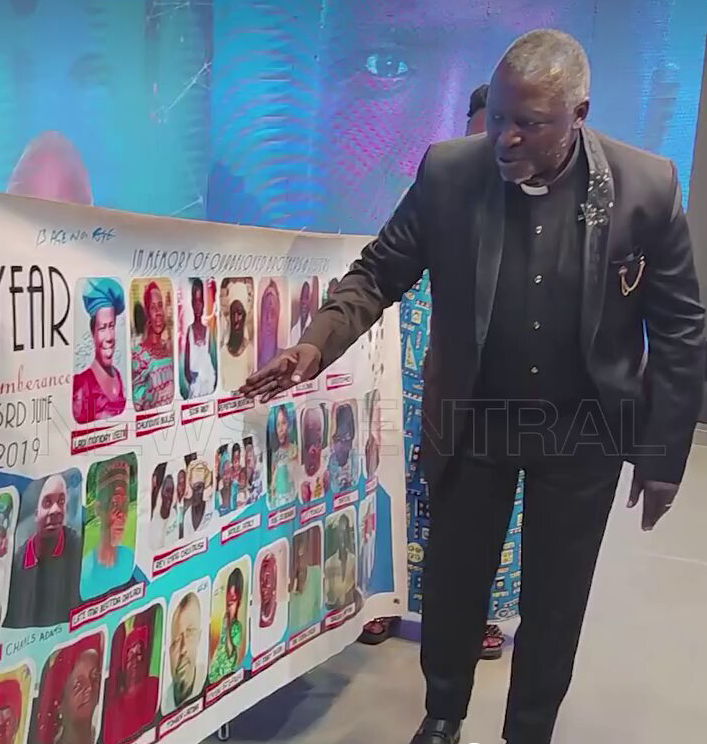
“Even Nollywood Wey Blow Me Never Pay Me ₦33m Per Film” — Ninalowo’s Shock as Impostor Allegedly Cheats Woman of ₦33m

Nollywood star Bolanle Ninalowo found himself in an unwanted spotlight on Thursday after a petition to the Economic and Financial Crimes Commission (EFCC) accused a man impersonating him of defrauding a woman of ₦33 million. The petition, filed in Abuja by lawyers acting for the victim, alleges that the suspect — named in the documents as Mr. Bolanle Azeez — posed as the actor on social media, lured the complainant into a relationship of trust and persuaded her to send money for supposed business and personal reasons.
The documents, which the actor shared publicly on his social media accounts, say the victim, Mrs. Victoria Yemisi Ayano, met the impostor on TikTok in July 2024 and was allegedly duped into sending funds in tranches until the total loss reached ₦33,000,000. The petition, prepared by Olamide Oyetayo & Co., attaches WhatsApp exchanges and bank-transfer records which the lawyers say prove the scheme. When the woman confronted the man after discovering she had been cheated, the petition states, he denied wrongdoing, cut off contact and refused to refund the money.
Ninalowo’s reaction blended incredulity and indignation. Sharing the petition on Instagram, the actor wrote — in a post that quickly spread across entertainment timelines — that the sum involved was staggering and implausible as payment for any Nollywood role he knew of. “N33,000,000 for wetin? Even Nollywood wey blow me never pay me N33M per film,” he wrote, adding a mix of humor and despair that many of his followers echoed: “Which kine juju be this naa?” The actor’s post, which also included a warning to fans about fake accounts, amplified the story and prompted a flurry of comments and shares.
The case has renewed concerns about a persistent problem for Nigerian celebrities: identity theft and social-media imposture. Ninalowo is no stranger to the phenomenon. In 2023, a court in Warri sentenced a trio of internet fraud suspects after the EFCC prosecuted cases that included impersonation of the actor; one of the convicted men, Omoghan Destiny Igbinosa, received a two-year jail term for offences that included impersonation and obtaining by false pretense. That precedent underlines the criminality of the acts alleged in the latest petition and shows authorities have, in the past, treated such matters seriously.
Online reaction to the ₦33 million allegation split quickly between sympathy and skepticism. Some commentators blasted the fraudster and urged the victim to pursue all legal avenues to recover the money; others faulted the victim for engaging financially with someone she had not met in person. Many users, however, focused on the ease with which impostors can create convincing social-media profiles and exploit the goodwill or naiveté of followers. Celebrities and influencers, commentators noted, often lack formal verification tools on platforms favoured by younger users, which makes it easier for fraudsters to mimic their brands.
The petition lodged with the EFCC lists offences that mirror Nigeria’s cybercrime and fraud statutes — impersonation, obtaining by false pretense and other cyber-enabled fraud. Legal practitioners who have handled similar files say successful prosecution depends on the paper trail: chat logs, bank transfers, phone records, IP addresses and other metadata. The lawyers representing Mrs. Ayano told reporters they have preserved copies of conversations and transaction proofs and expect the EFCC to open a formal investigation.
Beyond the courtrooms, the incident has sparked renewed calls for stronger safeguards on social platforms and for celebrities to be proactive in protecting their identities. Media analysts point to a combination of platform responsibility and individual vigilance: clearer verification marks for public figures, tightened account-creation checks, and legal penalties for repeat offenders that act as a deterrent. Several social-media users urged the platforms to do more to flag and remove impersonator accounts once complaints are lodged, while consumer-rights advocates recommended public education campaigns to help people recognise common fraud patterns.
For now, the story remains a cautionary tale. Ninalowo’s public distancing — wry remarks about the impossibility of earning ₦33 million per film and a direct warning to followers — has put fresh pressure on authorities to move swiftly, and on social platforms to shore up verification and takedown procedures. The EFCC has been asked to comment through the lawyers who filed the petition, and the agency’s past actions in similar matters suggest investigators will at least open preliminary enquiries. Whether the case ends in recovery of funds or criminal convictions will depend on the evidence trail and the speed of digital-forensics work.
In the court of public opinion, the episode has already done damage: a woman out of pocket by tens of millions, an actor forced to issue denials and explanations, and a reminder for millions of social-media users that not every verified-looking profile is what it seems. The simplest takeaway — one repeated by Ninalowo’s supporters and sceptics alike — is that online relationships involving money demand an abundance of caution. As this case moves through Nigeria’s legal machinery, it will test whether the combination of public outcry, police action and platform cooperation can keep pace with an ever-evolving wave of online imposture.
Reporting compiled from the petition shared publicly by the actor and coverage by national news outlets.


